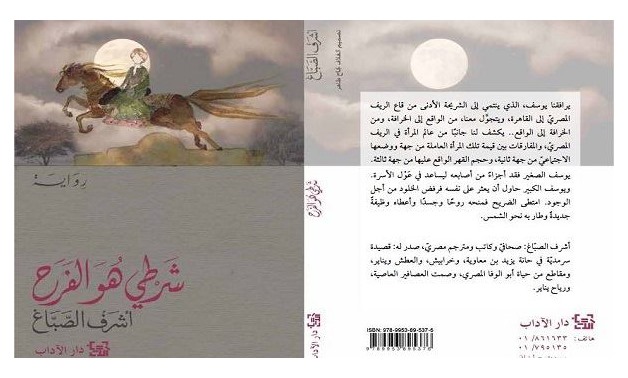
Book cover. Source: Ashraf el Sabbagh's facebook page
CAIRO- 9 August: The title of Ashraf el Sabbagh's latest novel is ambiguous, but once we reach the phrase said by the daring female character seducing our hero in the novel, we understand the message. The rest of the phrase reads “My condition is Joy …
Happiness does not exist … Joy is life” we realize that she knows that happiness in unattainable in this world. Joy is the only possibility … the only condition to live happily no matter how briefly is to be joyful.
The novel explores Youssef’s life using techniques of flashbacks, montage, cutting scenes in his life, introducing events in appropriate times. It starts deep in Cairo bars then flashes back to his migration to Cairo, working among the workers and the dire conditions they live in, losing his fingers under one of the machines, then returning to his village with flashbacks on his childhood and the tiny details of the daily life of the women in his family and the Egyptian country side in general.
The writer tells us that the Gods created the universe, then man and made him in the best possible image then left him to fulfill his destiny. They put a safety measure in case things got out of control, they send a prophet here or there to guide the flock.
The prophets are an exclusive men’s club. No women prophets was send, yet women are present and influential the whole time. Between the weak oppressed women in the Egyptian country side and the daring girl friend / lover /friend with benefit in the city, Youssef look into women in his life like a psychic, he details their lives, their fears, desires and rebellion as well.
The novelist brilliantly grasps commonalities between people of the big city and those of the country side; they make up their own belief system. The curses related to the village’s geography and the city’s meanness and the grace related to the “Holy People” who supposedly bring blessings to those who believe in their powers and bring them offerings. Those holy ones are in both the city and the village.
The novel’s climax comes after a long introduction to the cursed stagnant stream of the Nile in his small village versus the Sufi shrine of Sidi El Kharashy. Everyone is warned not to go or swim in the stream. Those who went never returned. Many stories are told about the curses and the stream, they contradict sometimes yet the magical themes are always fascinating to the commoners. On the other hand the shrine is where people worship the super powers of Sidi el Kharashi where supposedly women can bear children if they are barren and men regain their manhood; all the reasons of worry are cured by the shrine and due to old beliefs.
Youssef’s return to the village brings the stream, the spirits who make sounds at night, flashback to his first sexual experience; described in a very classy way, felt, enjoyed by the reader. His lover Mahfooza eventually disappears and become a spirit. The villagers hear her talking in the cold nights; she eventually gets the holy title.
The women in the village broke the traditions and the men ignored the De Facto position of Mahfooza as holy. On her “festival” date, the offerings, the prayers and the followers are everywhere asking for her blessings.
The taboo subjects discussed in the novel are many, the non-stop beating of women in the family, the girls urge to get married, the old ways of personal hygiene for girls are described in a nice way … old Egyptian habits that lasted until now and finally the intimate details between men and their wives; the unspoken subject of sodomy. The writer dared to attack the reader who may be totally ignorant of such subjects.
The psychological pain that the character is feeling continues from beginning to end, it is felt but not repulsive to the reader. The protagonist simply wants to reach an understanding to life which we are all trying to do in our lifespan.
Once back in the village the novelist take us to a new land, a different kind of pain, the wild nature of trees that almost tell the love stories and the tragedies that occurred by them since the village existence. The curse that seems to be built in the village due to the stream it reaches everyone in different ways.
Between the cursed stream and the shrine of the holy man, Youssef throws himself in the river, grows wings and becomes a soul flying towards the sun in a clear symbolism to the first God on earth. In a surrealistic way, the writer describes paradise, a place without time, no words nor choices, bodies dissolve in water, desires are combined with conscience, wishes are materialized before they are expressed …
basically the eternal world of the unknown. Youssef’s character is loaded with myths, pains and the contradictions of all human beings, their built-in weaknesses and flawed patterns as well as their beauty and joy in spite of the misery they live in by just existing. Now he is faced with the choice between eternity and mortality.
After the paradise he saw, the one with no confusion or perplexity, where no sin is committed, no punishment or reward, the logical choice is to go for eternity rather than mortality he already experienced and lived. Yet Youssef chose mortality and disappeared creating his own legend and Holiness that will be told by the villagers in the years to come.
The message here is simply humans would chose life with its pain and joy rather than become eternal with no struggles.

Comments
Leave a Comment